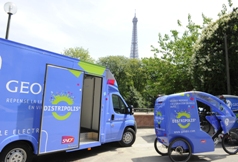French logistics group Geodis has launched a high-profile, environmentally-friendly innovativecity logistics project for Paris and aims to roll it out in major French cities and selected
European capitals in the next five years.The concept, entitled ‘Distripolis’, is a new way of organising urban logistics that is morerespectful of the environment and the inhabitants of large cities, the company explained. It willsignificantly reduce CO2 emissions and atmospheric pollution, together with a decrease in soundpollution and urban congestion.
Under the scheme, Geodis will consolidate goods destined for city centre addresses at a largelogistics centre, transport them to a small number of ‘BLUE’ distribution centres within the cityand then deliver them from there to the final recipient using environmentally-friendly vehiclessuch as electric vans and tricycles.
Distripolis was officially presented yesterday by Guillaume Pepy, Chairman of SNCF and PierreBlayau, CEO SNCF Geodis, at a ceremony in the presence of Nathalie Kosciusko-Morizet, FrenchMinister of Sustainable Development, Transport and Housing, and Christian Sautter, Deputy Mayor ofParis.
In Paris, Geodis will transport goods for the city centre to its logistics hub at Bercy, in thesouth of the city centre and close to the E15 motorway (the ‘Périphérique’). From there, goods willbe divided into shipments for eight ‘BLUE’ urban logistics distribution centres located close tomajor retail areas in Paris.
Final delivery of small parcels and pallets up to 200 kg from BLUE bases will be made using ‘green’ vehicles such as electric-power vans and power-assisted tricycles, while deliveries of over200 kg will be done with Euro 5-compliant trucks and, in the long-term, Euro 6-compliant or hybridtrucks.
The group will make use of its diverse businesses, including Geodis Calberson, Geodis Ciblex andFrance Express, to operate the Distripolis scheme.
The environmental impact of Distripolis in Paris will, as early as 2011, be reflected in a365-tonne equivalent reduction in CO2, greenhouse gases and particulate matter, which will be an18% decrease compared with current Geodis activity in the capital. The impact will be considerablystronger when the system is fully in place in 2015, with an annual reduction of 1,747 tonnesequivalent of CO2, greenhouse gases and particulate matter. This will be 85% less than today.
Implementation of Distripolis in Paris will last from 2011 to 2015. In 2011 and 2012 the ParisBercy and Gare Montparnasse BLUE bases will be opened with 20 Electron electric vehicles and eightpower-assisted tricycles. Between 2012 and 2014 the opening of the Gare du Nord, Gare Saint-Lazare,Les Halles and Avenue Foch BLUE bases will take the tally of Electrons to 31 and the number ofpower-assisted tricycles to 40. The rollout will be completed in 2015 with the opening of theQuartier Latin and Gare de l’Est BLUE bases, making a total of 75 Electrons and 56 power-assistedtricycles.
The vehicles departing from BLUE bases are clean and silent, Geodis stressed. The 75 Electronelectric vehicles, with a loading volume of 20 m3, will be leased from Fraikin. At the same time,Geodis is introducing a new IT system to optimise city routes which has already resulted in a 5%reduction in the distance travelled by delivery vehicles.
Geodis said its objective in the five coming years is to develop Distripolis in about 30 majorcities across France and to establish a presence in European capitals with a view to introducing aEuropean multimodal network for more efficient and environment-friendly final-mile goods deliveryin large cities.
This could involve using up to 287 Electron electric vans and 214 tricycles once the schemes areoperating in the different cities. This would result in reducing CO2 emissions by 6,630 tonnes ayear.












